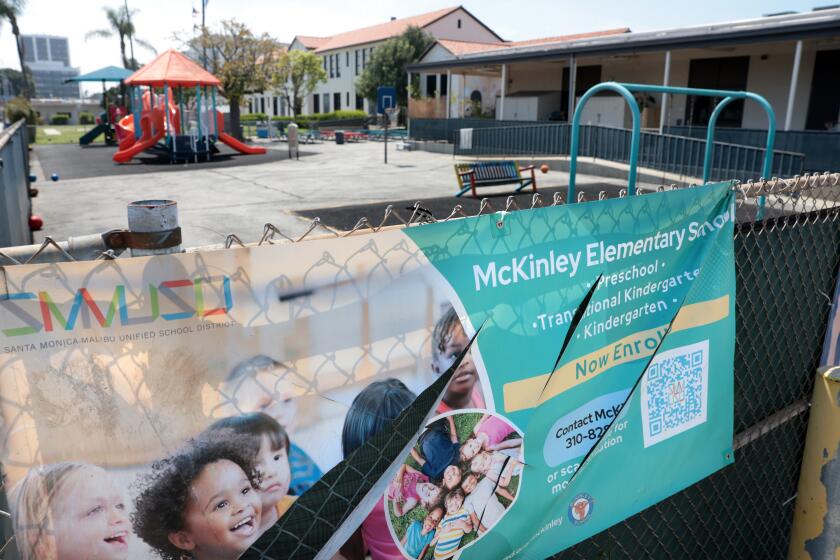Turning academia into a cafeteria
DECADES AGO, I clutched an official New York state examination booklet as a proctor threatened me and hundreds of my nervous schoolmates with a felony conviction if we cheated. We dutifully signed a statement that declared we would not.
Students still sign declarations on examination booklets, but the lingo has changed. Choice is now in. The official blue examination booklet at UCLA, where I teach, requires students to affix their signatures to a clause swearing that they have not committed “academic dishonesty.” The penalty for transgression, it warns, is suspension or dismissal. Yet instead of dropping it there, the credo continues and the tone shifts. “There are alternatives to academic dishonesty,” it suggests, and counsels that the student see a professor or dean “to discuss other choices.”
“Discuss other choices”? I have pondered this wisdom -- and its plural formulation. What other choices? “There are alternatives to academic dishonesty.” How many alternatives are there? Five? 10? Is honesty just one alternative among many and, depending on the season, another might be equally acceptable? What would a good professor or dean say to the student who exclaims that academic honesty is just not working and that he or she wants to pursue other “choices”?
We live in a choice-addled society. The jargon of choice, a second cousin of diversity and multiculturalism, undermines intellectual integrity and coherence. “Choice” and “diversity” are universal passwords that unlock all doors. Who can oppose them without appearing authoritarian?
These terms dazzle an academic and liberal left, which regularly uses them to disassemble a curriculum. For instance, reformers some years ago floated to great effect a proposal “to teach the conflict.” If some instructors could not decide whether a classic English novel was homophobic or imperialist, they should “teach” the “conflict” and let the students decide.
The notion was seductive, but it opened the way to teach anything and everything in the name of airing a dispute. Were television situation comedies great literature? Teach the conflict. For a while, one counted on resolute conservatives to resist this intellectual guff and to remind us that not every view is worth teaching. No longer. Conservatives and even religious fundamentalists now talk the talk of diversity and choice.
Adherents of “intelligent design,” for instance, which is now mandated to be taught in five states and proposed in 20 others, often defend it as giving students choice. Students should be allowed to choose between Charles Darwin’s evolution and the notion that God created species. The Kansas Board of Education recently agreed. As supporters of the decision explained it to reporters, they were simply trying to “open the curriculum” to alternative viewpoints. The Kansas chairwoman of a conservative group, Judy Smith, employed familiar leftist cant in defending the board. “Teaching the controversy will enhance Kansas students’ ability to look at the evidence and ... ultimately make their own decisions about origins [of life].” To this sentiment Smith added, “Academic freedom is what we hope for in the education of our children.”
But the jargon of choice and diversity actually corrodes academic freedom, which once referred to the freedom of college instructors to teach what they considered salient, subject to the review of their peers, not outside authorities. Today, it increasingly means the freedom of students to hear what they -- or their parents -- want.
Several conservative groups now view academic freedom through the lens of diversity and choice. An outfit called Students for Academic Freedom, which claims chapters on hundreds of campuses, collects information on what it considers one-sided or controversial classes. The group pushes the so-called Academic Bill of Rights, written by the conservative activist David Horowitz. It defines academic freedom as lots of choices for students.
“While teachers are and should be free to pursue their own findings and perspectives in presenting their views,” reads Principle No. 4, “they should consider and make their students aware of other viewpoints.” It adds that professors should “welcome a diversity of approaches.”
As attractive as these principles seem to be -- diversity, choice, alternatives -- what do they actually mean in the classroom? Must an astronomer teach astrology? The course on early Christianity include militant atheists? A class on the Holocaust, the Holocaust deniers? A lecture on 9/11, the conspiracy theorists? These “other viewpoints” all have a bevy of experts behind them. The few qualifiers tossed into the proposed Academic Bill of Rights, which specify that diverse views be aired only “where appropriate,” do not undo the damage.
Under such proposals, the locus of academic freedom moves from teachers to students and parents. “Diversity” and “alternatives” and “choice” for students actually signal the eclipse of academic freedom for teachers, and the spread of bland, if not dishonest, courses. Teachers become purveyors of choice in a full-service cafeteria. Let the students decide between Darwin and Trofim Lysenko or “The Origin of Species” and Genesis. Mesmerized by the jargon of choice, we forget a basic principle: Truth itself is partisan.



